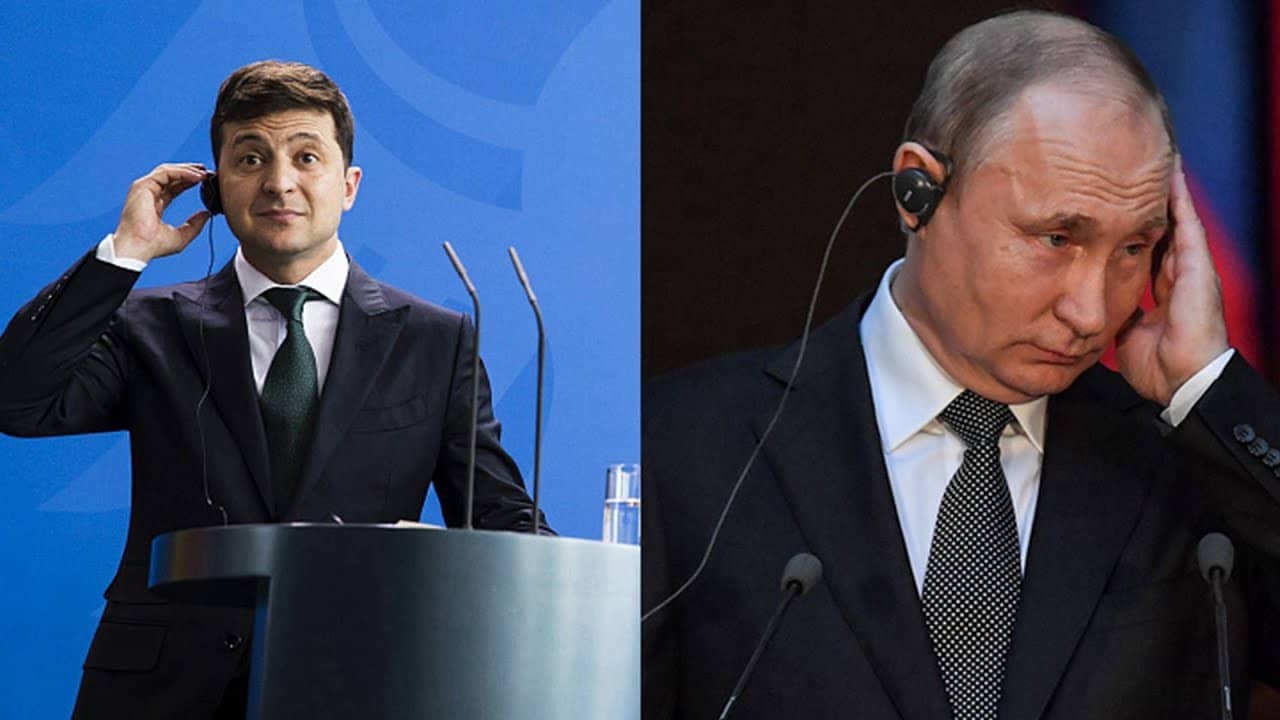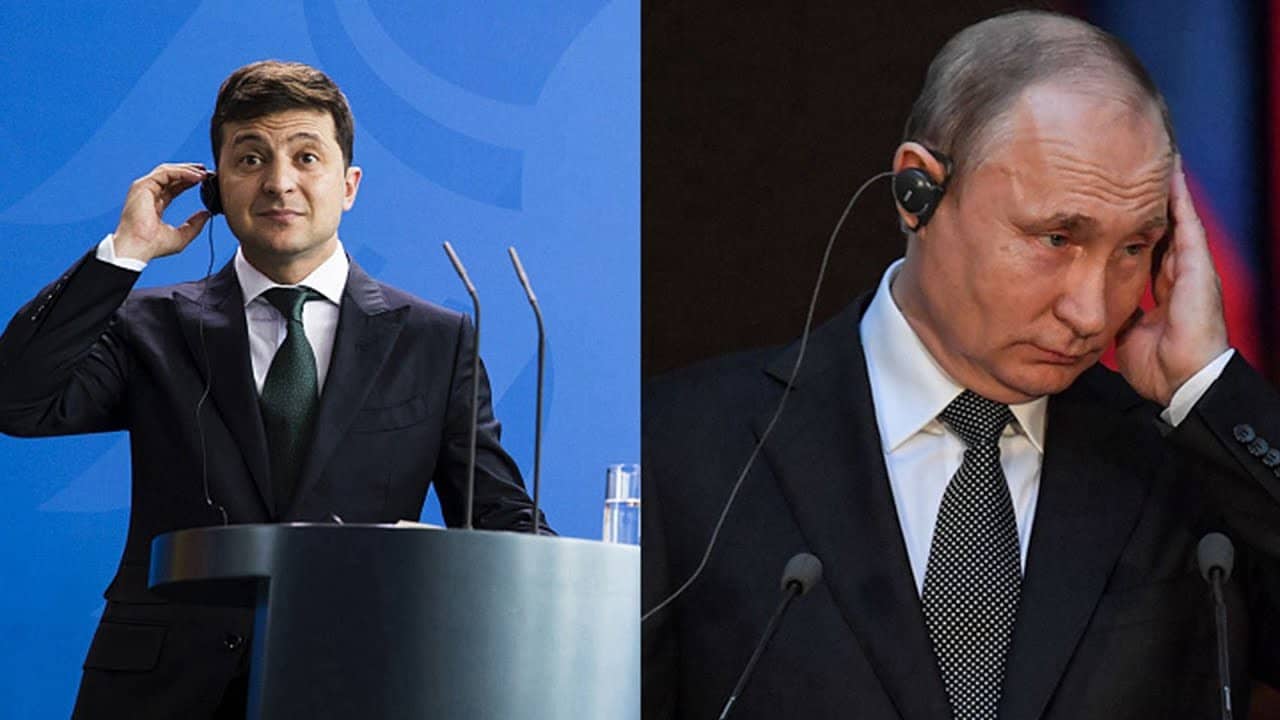The controversy swirling around the phone conversation between the US President Donald Trump and Ukraine President Vladimir Zelensky regarding the business interests of former vice-president Joe Biden’s son is having a salutary effect on the conflict in Ukraine.
The US Special Representative for Ukraine Kurt Volker has resigned from his official position once it transpired that his name appeared in the whistleblower complaint about Trump’s dealings with Zelensky. (Meanwhile, Trump’s personal lawyer, Rudy Giuliani, also implicated Volker saying latter encouraged him to speak to Ukrainian officials regarding Biden and his son Hunter Biden.) Volker is expected to testify in the Congress’ impeachment inquiry on Thursday.
Now, Volker also enjoys impeccable reputation as a Russia hawk with extensive diplomatic experience on that front in NATO previously. He recently said that “there is a long way to go before there would be any normalisation between the two countries (Russia and Ukraine). Russia’s invasion, occupation, and claimed annexation of Crimea will never be accepted by Ukraine.”
Volker’s exit is the surest sign that for the foreseeable future, US-Ukraine relations have become toxic. Put differently, for the first time after the “regime change” in Ukraine in 2014, no US official worth his salt will want to risk hobnobbing with the powers that be in Kiev.
This “hands-off” phase gives Zelensky a free hand to handle his country’s relations with Russia. The same holds good for Moscow which gets an opportunity to deal with Kiev without the Americans breathing over the neck of the Ukrainian president.
It is in this backdrop that we need to asses the outcome of the meeting of the Trilateral Contact Group on Ukraine – Ukraine, Russia and the Organization for Security and Cooperation in Europe — in Minsk on October 1. The meeting agreed to a peace process known as the “Steinmeier Formula,” green-lighting local elections in the Russian-controlled regions of Donbas.
The meeting agreed that the warring parties will withdraw their military and equipment in Donbas, dismantle fortifications, and conduct de-mining. The agreement envisages that the separatist regions will get a special self-governing status after they hold local elections. (The pro-Russia separatists are seeking a special status allowing for self-governance in the Donbas region, large parts of which have been under their control since April 2014.)
In preparation for the election, the Ukrainian government and separatist leaders will withdraw troops from two locations in the Donetsk and Luhansk regions next week. No doubt, this development signifies a major step by Zelensky toward resolution of the conflict in eastern Ukraine.
The “Steinmeier Formula” is a concept attributed to then German Foreign Minister (presently president of Germany), Frank-Walter Steinmeier dating back to 2015-2016, designed to implement the political clauses of the Minsk “accords” (2014 and 2015) to settle the conflict in Donbas.
However, the concept could not be implemented due to Kiev’s reservations (under American pressure.) Washington persuaded Kiev that Steinmeier’s Formula in effect served to legitimise Russia’s “proxies” in the separatist regions by means of staging local elections, which in turn aimed at allowing Russia’s de facto control of that territory, even if the territory were to be notionally reinserted into Ukraine.
The former pro-US Ukrainian President Petro Poroshenko simply refused to work with Russia, Germany and France to codify Steinmeier’s Formula. Indeed, the US strategy aimed at preventing any “thaw” between Kiev and Moscow.
Poroshenko maintained that holding democratically valid elections in Donbas under the shadow of a Russian presence there was unthinkable. Volker too repeatedly articulated this stance. In early September, Volker was quoted as saying that a secure environment would have to be established in Donbas before implementing the political and technical procedures for holding elections.
Volker underscored that as minimal preconditions to a secure environment, the Russian military must withdraw from Donbas, the Russian-backed separatist forces must be dissolved, and the Ukrainian side of the border has to be brought under non-Russian control.
The Russian interpretation of the Minsk accords has been that all solutions (special status, elections, border control, etc.) be negotiated between Kiev and the separatist leaders in Donbas. Germany and France do not challenge the Russian interpretation.
Therefore, the breakthrough on Tuesday must be equally attributed to the political transition in Kiev leading to the election of Zelensky (on a mandate of resolving the conflict in Donbas and normalising relations with Russia) as well as the elbow room he is getting lately to shake off American pressure. Volker’s exit will do a world of good for resolving the Donbas conflict.
The agreement on October 1 paves the way for a summit between Zelensky and the leaders of Russia, France and Germany within the ambit of the “Normandy Four” (France, Germany, Russia and Ukraine). Russia had previously refused such a meeting, unless Ukraine agreed to hold local election in the Donbas region.
On Tuesday, Zelensky said that nothing should stand in the way of the summit, and that a date would be announced soon. The French President Emmanuel Macron said he expected the summit in the coming weeks.
Germany, which authored the Steinmeier Formula, feels gratified. The German Foreign Minister Heiko Maas said, “I am glad that the constructive atmosphere at the session of the Contact Group in Minsk has led to long-awaited progress. This makes way for the Normandy Four summit and further steps in the implementation of the Minsk Agreements.”
The Kremlin concurs, too.
The “big picture” is that Russia’s relations with the European powers are looking up, finally. The close consultations between Macron and Russian President Vladimir Putin in the recent weeks and months are resulting in a determined effort to address the frozen conflict in Ukraine, which had led to the EU sanctions against Russia. (See my blog Eurasian politics on the cusp of change.)
On the other hand, liberated from the clutches of manipulative American diplomats, especially following Volker’s exit, Zelensky can be expected to advance his strategy to improve relations with Russia. In fact, Zelensky has lost no time to initiate the first steps to introduce legislation giving “special status” to Donbas.
“We will have a new law, that will be drafted by the parliament in close cooperation with the pubic after a public discussion. No red lines will be crossed in it, and that is why there will be no capitulation,” Zelensky said on Tuesday.
Reprinted with permission from Indian Punchline.


